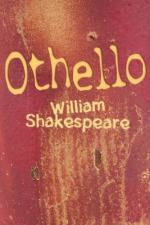|
This section contains 5,869 words (approx. 20 pages at 300 words per page) |

|
SOURCE: Fultz, Lucille P. “Devouring Discourses: Desire and Seduction in Othello.” In Othello: New Essays by Black Writers, edited by Mythili Kaul, pp. 189-204. Washington D.C.: Howard University Press, 1997.
In the following essay, Fultz interprets Othello as a drama of linguistic subversion represented by Iago's desire to discursively seduce and manipulate Othello, Desdemona, and the other principal figures in the drama.
In her “Introduction” to Othello: New Perspectives, Virginia Mason Vaughan delineates the genealogy of Othello criticism, which according to her, “remained … a bastion of formalism and psychological analysis” well into the 1980s (13). Prior to this period, according to Vaughan, Othello critics were concerned with issues of textual history and authority, while debates swirled around issues of definitive editions and textual conflations. Vaughan maps the movement of criticism from controversies surrounding “which version was better” or “closer to Shakespeare's original text” to analyses of patterns of language...
|
This section contains 5,869 words (approx. 20 pages at 300 words per page) |

|


